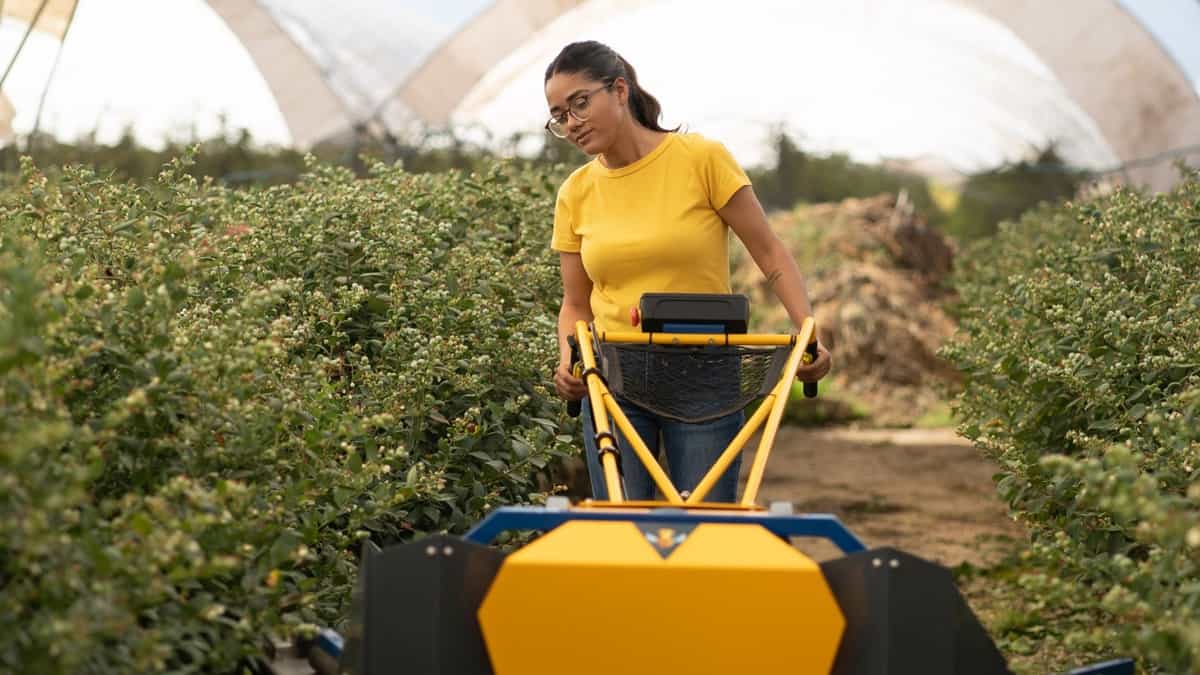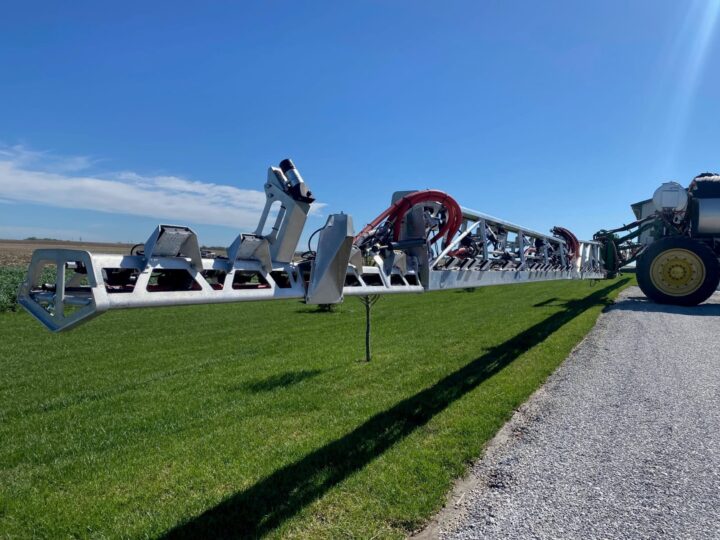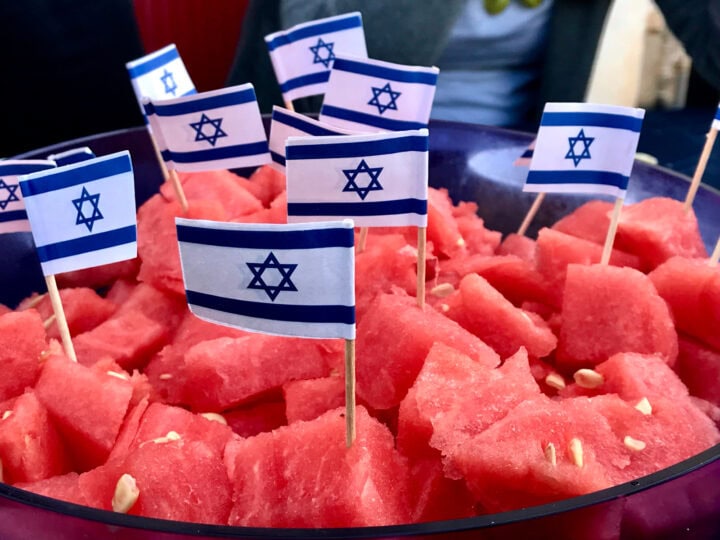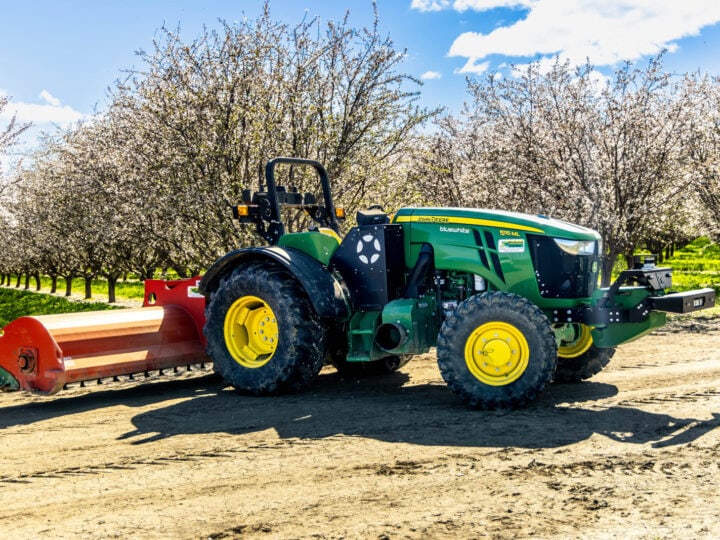Colony collapse disorder, a phenomenon where bees die for mysterious reasons, caused alarm in recent decades and spurred a flurry of “save the bees” campaigns — because honeybees are needed to pollinate the plants that provide our food.
But the bigger problem, according to Emily Speiser, VP of marketing for BloomX, is that honeybees, which have become the default bee for pollination in commercial agriculture because they’re easier to transport and manage — is that they aren’t as efficient as wild bees in pollinating specific fruits and vegetables like blueberries and avocados.
In addition, says Speiser, there aren’t enough honeybees as the world’s food needs grow.
Quoting figures from the UN’s Food and Agriculture Organization, Speiser says, “Since 1961, agricultural land has expanded by 600%. In the same time period, the number of managed honeybee hives has expanded by only 83%. So, we have a supply and demand problem.”
For instance, every year, some 48 billion honeybees are shipped to California’s almond groves, and then rotated to other parts of the country to pollinate additional crops. During their journeys, many of the bees perish.
Robo-bees

BloomX is combating the honeybee population crisis with robo-bees.
The company, founded in 2019 in the small agricultural village of Rishpon where CEO Thai Sade once lived, developed robotic tools that pollinates as efficiently as a wild bee and without the risks involved with honeybees.
Robo-bees can bypass limitations introduced by some countries on “foreign” bees. Colombia, for example, prohibits bringing in bumblebees because they are not native and can harm the local ecosystem, Speiser explains.
BloomX is focusing primarily on pollinating blueberries and avocados for now.
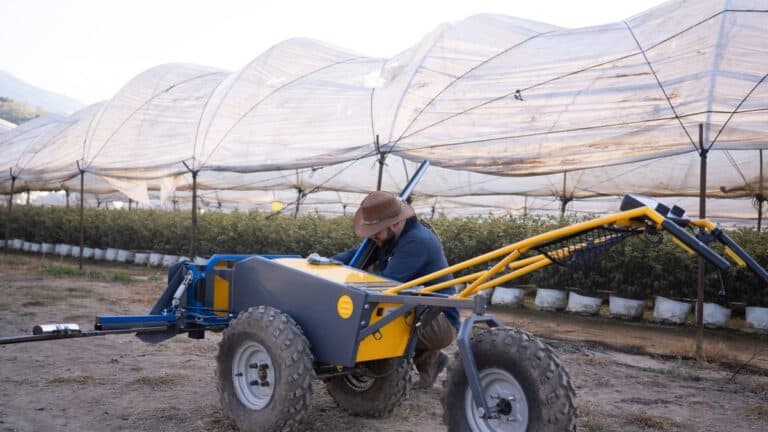
“These are cash crops and we wanted to show a high ROI,” Speiser explains.
“Blueberries are expensive. Avocados, too. We wanted to reach out to growers who will be able to immediately see the value we bring with high revenue coming from a significant yield increase and improved fruit quality.”
BloomX’s first product, Robee for blueberries, has mechanical arms and the ability to “bio-mimic” the buzz of the bee.
Pollinating blueberries involves shaking the flowers to move the pollen from the berries’ male to female parts. In nature, this job is done most efficiently by bumblebees.
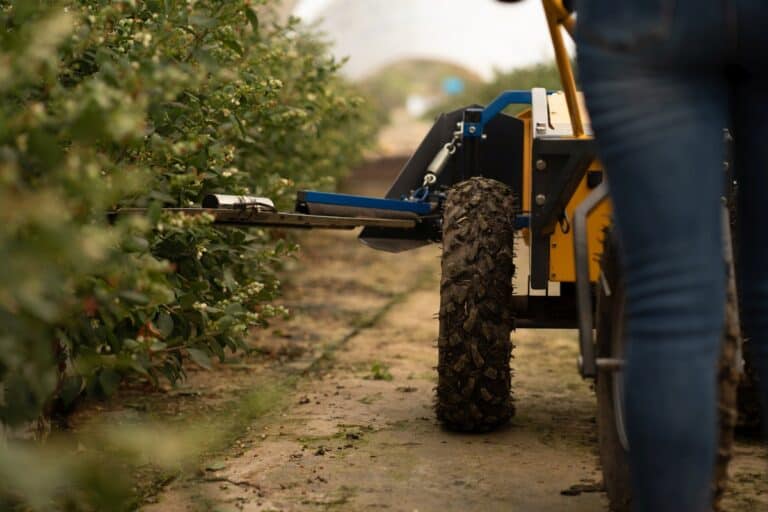
In fact, when BloomX first started, it was known as Bumblebee AI. The name change to BloomX helps position the company for more use cases with different plants and different types of bees. Each crop requires different mechanisms, Speiser tells ISRAEL21c.
Avocado pollination
BloomX’s second product is the robotic Crossbee for pollinating avocados.
Male and female flowers of avocado trees generally open at different hours and require cross-pollination.
Rather than shaking, like Robee, Crossbee mimics the electrostatic forces — the kind you get when you rub a balloon on your hair — that are applied by the bee to extract the sticky pollen grains.
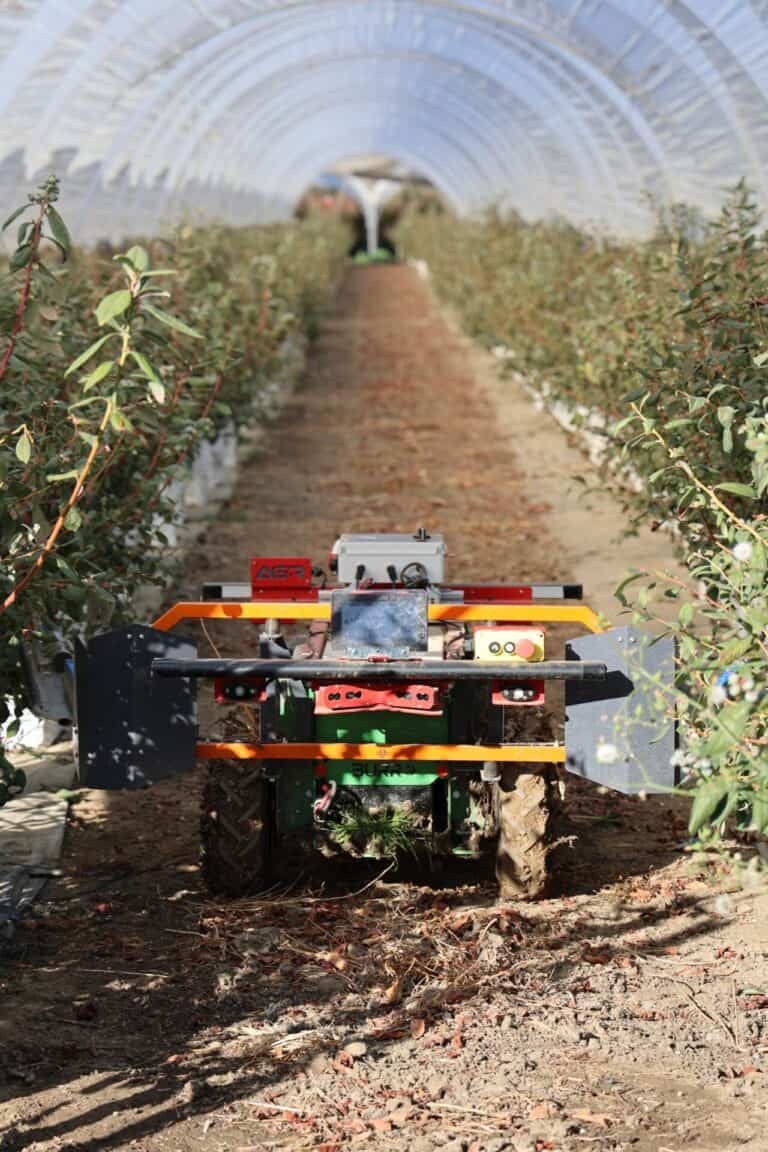
Another complication is that there are Type A and Type B avocado trees. The Haas avocado, for example, is the best-selling Type A tree. It is generally pollinated by honeybees that have recently visited a Type B tree, such as the Ettinger. But honeybees tend not to be attracted to the Haas variety at all.
So, the Crossbee removes the pollen from male avocado flowers by extracting it into a “frame” which can then be removed from the Crossbee and stored without preservatives for up to 24 hours until the female flowers are open and ready for pollination.
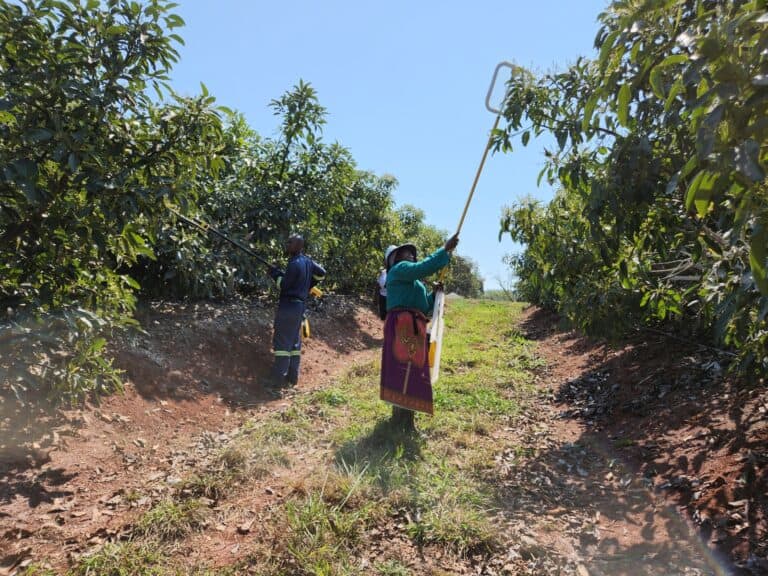
Often, growers plant two different varieties of avocado so that the pollination between male and female can be synchronized. In these cases, Crossbee doesn’t need to store the pollen.
What fruits are next on BloomX’s agenda? Apples and mangos, Speiser says, as well as other types of berries beyond the blue ones. Greenhouse tomatoes are also a target.
Data driven
There’s one more piece to BloomX’s pollen solution: data.
The BloomX app taps into databases and artificial intelligence to give growers intel on the best time to pollinate the appropriate flowers.
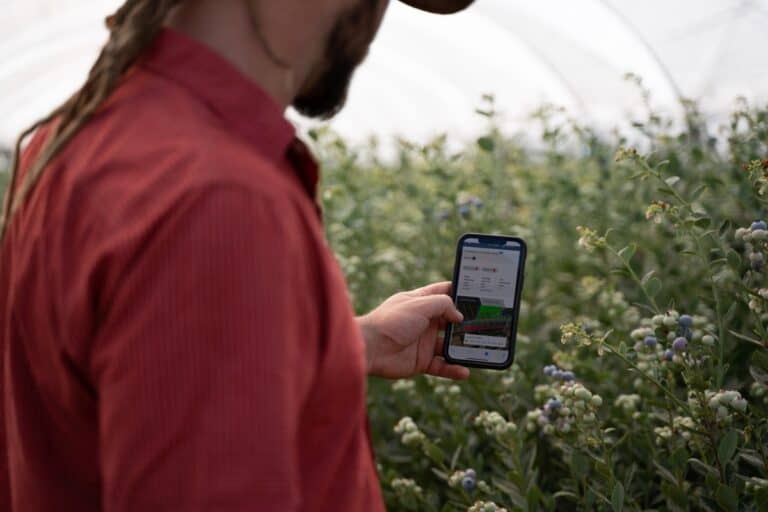
Which varieties will be open and receptive at what time during the day? Are they Type A or Type B? Male or female? What’s the impact of temperature, humidity and exposure to light?
“We take our agricultural knowhow of how these environmental factors affect flower receptivity and provide the grower a daily ‘window’ of time for pollination, so the grower can plan ahead,” Speiser says.
BloomX has paying clients in Latin America (Mexico, Peru and Colombia), South Africa, Israel and the United States, where BloomX is running a proof-of-concept study.
Given that everything agricultural is becoming self-driving, including huge John Deere tractors, we asked Speiser why BloomX’s robo-bee vehicles are not autonomous.
“We wanted to grab the market and to be first,” she explains. “Peru is the No. 1 exporter globally of blueberries. Forty-five percent of the world’s avocados come from Mexico. They don’t suffer from a shortage of labor, but their workforce is not that tech savvy. If we offered an autonomous tool from the get-go, I’m not sure they would adopt it.”
Nevertheless, BloomX has a partnership with Tevel Aerobotics, whose flying autonomous robot (FAR) grabs fruit off trees. Instead of a picker, BloomX mounts an electrode payload on the FAR that extracts pollen from the avocado trees.
Bigger yield
According to BloomX, Robee can increase blueberry yield by up to 30% and decrease small-size fruit by 55% while increasing large-size fruit by 29%.

“We all want big blueberries,” Speiser notes. “You can charge almost twice the price for large-size fruit.”
Avocados do even better: Farmers using Crossbee have seen a 40% increase in yield with 200% more of the preferred consumer-size category for the fruit (like Goldilocks, most consumers choose medium avocados).
Environmentally, the BloomX system removes the need to transport bees from field to field during pollination season, and allows farmers to use less pesticide and herbicide. And, of course, it is not subject to bee “moods” – if it’s too hot, real bees will stay in the hive; if it’s too cold, they go dormant.
BloomX is thinking buzzy big. The 17-person company has raised $8 million to date.
BloomX’s end goal, Speiser adds, is that “in 10 to 15 years, we will replace honeybees for pollination entirely with biomimicking.”
The buzz from Israel
Given Israel’s agricultural roots, it’s not surprising there are a busy hive’s worth of bee-focused startups in the country. They include:
- Bee-io, which aims to make honey without bees.
- BeeWise, which can house up to 40 colonies, or two million bees, allowing beekeepers to remotely care for their hives.
- BeeHero, which helps farmers optimize where to place hives.
- BioBee, which replaces honeybees with bumblebees.
- ToBe, which sprays a miticide to combat varroa, a parasite that feeds on honeybees and infects them with dangerous viruses.
- Edete, which has developed an artificial pollination technology using vehicles that resemble tractors.
To find out more about BloomX, click here.




